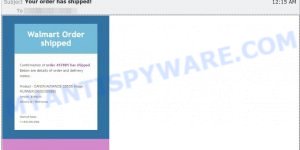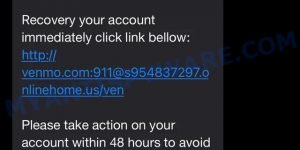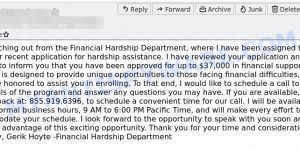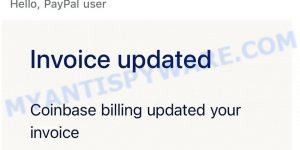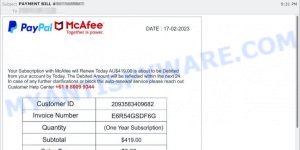Identity theft is a growing concern in today’s digital age, and scammers are constantly looking for new ways to exploit people’s fears and vulnerabilities. One such scam that has recently been making the rounds is the “Cash Settlement Awarded” email, which claims to be from the West Chester Magistrates’ Court in the United Kingdom. The email informs the recipient that their identity has been stolen and that they are eligible for a cash settlement as part of a larger settlement awarded to victims of a data breach. However, a closer look at the email reveals several red flags that suggest it is a scam designed to steal personal information from unsuspecting victims.
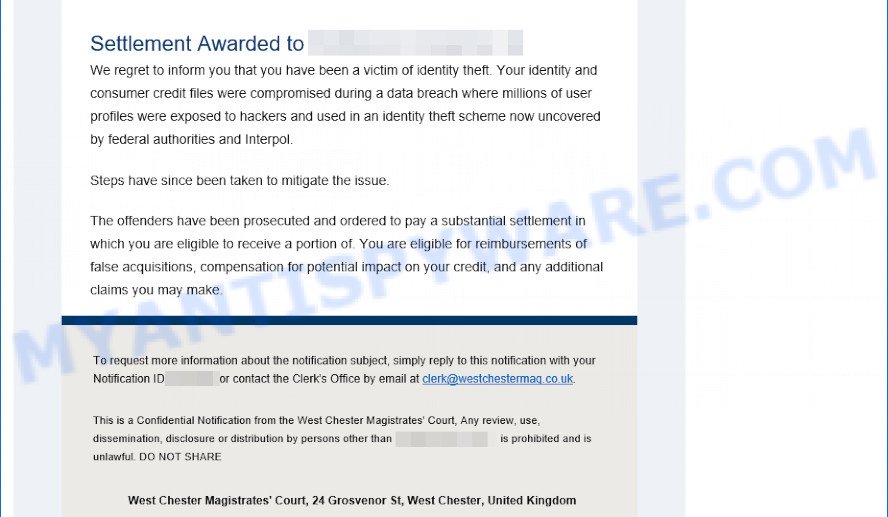
QUICK LINKS
- The Tricks and Red Flags of the “Cash Settlement Awarded” Scam Email
- What to do if you receive the Cash Settlement Awarded Scam Email?
- How to spot and avoid scams like the “Cash Settlement Awarded” scam email?
The Tricks and Red Flags of the “Cash Settlement Awarded” Scam Email
The Cash Settlement Awarded email scam is a fraudulent email sent to people claiming that they have been victims of identity theft due to a data breach. The email says that the offenders have been prosecuted and ordered to pay a settlement, from which the victim is eligible to receive a cash portion. The email asks the victim to reply with a Notification ID or contact the Clerk’s Office to request more information.
There are several red flags and suspicious elements in this scam email:
- Firstly, the email claims to be from the “West Chester Magistrates’ Court”, which is a nonexistent organization. When you search for it on Google, you’ll only find pages related to this particular scam email, which should be a red flag. Additionally, the email doesn’t provide any verifiable contact information for the supposed court, such as a phone number, which is another indication that it’s not legitimate.
- Secondly, the “West Chester Magistrates’ Court” website (westchestermag.co.uk) contains no links and asks the recipient to enter a 16-digit code, while the email itself only contains a 10-digit code not divided into groups.
- Thirdly, the email contains language such as “This is a Confidential Notification,” “DO NOT SHARE,” and “This is not spam,” which are typical of scams.
- Fourthly, the email sender’s name and email account do not match the reply email for questions or inquiries.
- Fifthly, the email lacks any specific information about the victim or their account, which is suspicious.
Several people who have received this scam email have reported that it looks genuine but has raised red flags for them. Some of the red flags include the use of Americanized spellings, no specific information about the data breach, and the sender’s name and email account not matching.
A typical “Cash Settlement Awarded” scam email reads as follows:
Cash Settlement Awarded to XXXXXXX
We regret to inform you that you have been a victim of identity theft. Your identity and consumer credit files were compromised during a data breach where millions of user profiles were exposed to hackers and used in an identity theft scheme now uncovered by federal authorities and Interpol. Steps have since been taken to mitigate the issue.
The offenders have been prosecuted and ordered to pay a substantial settlement in which you are eligible to receive a cash portion of. You are eligible for reimbursements of false acquisitions, compensation for potential impact on your credit, and any additional claims you may make.
To request more information about the notification subject, simply reply to this notification with your Notification ID: xxxxxxx” or contact the Clerk’s Office by email at clerks@westchestermag.co.uk.
This is a Confidential Notification from the West Chester Magistrates’ Court, Any review, use, dissemination, disclosure or distribution by persons other than XXXXXXX is prohibited and is unlawful. DO NOT SHARE
West Chester Magistrates’ Court, 24 Grosvenor St, West Chester, United Kingdom
If you have questions or comments email us: help@westchestermag.co.uk
Overall, the Cash Settlement Awarded email scam is a classic example of a phishing scam that preys on people’s fears of identity theft and offers a too-good-to-be-true cash settlement in exchange for personal information.
Examples of such scams
Many email scams operate under the guise of official institutions, companies, or organizations to trick victims into sharing personal and financial information. These scams often use persuasive language, urgency, and fear to pressure individuals into taking immediate action. The Cash Settlement Awarded Email Scam is just one of many such scams that have emerged in recent years. Here are some other examples of similar scams to be aware of: Financial Hardship Department Scam, NortonLifeLock Billing Payment Email Scam, Amazon Account Locked Scam, and Geek Squad Email Scam
- Walmart Order Shipped Email Scam
- Venmo Account has been Locked Scam Email
- Financial Hardship Department Scam Email
- PayPal Coinbase Invoice Scam Email
- PayPal McAfee Scam Email
By familiarizing yourself with these types of scams, you can better protect yourself from falling victim to fraud. Remember, if you receive a suspicious email or phone call, it’s always best to verify the identity of the sender or caller before providing any personal information.
What to do when you receive the Cash Settlement Awarded Scam Email
Here are some suggestions for what to do if you receive the Cash Settlement Awarded Email:
- Don’t click on any links. The email may contain links that lead to a fake website designed to steal your personal information or install malware on your computer.
- Don’t reply to the email. Replying to the email could confirm to scammers that your email address is active, which could result in more spam or scam emails.
- Check if the organization exists. Do some research to see if the organization mentioned in the email actually exists. If it does, contact them directly to ask if they have any knowledge of the email. If it doesn’t, it’s likely a scam.
- Report the email. If you’re unsure if the email is a scam or not, report it to the relevant authorities, such as the Australian Competition and Consumer Commission (ACCC) or your local police department.
- Keep an eye on your accounts. If you’ve provided any personal information to the scammers, monitor your bank and credit card statements closely for any unusual activity.
Remember, it’s always better to be cautious and skeptical when receiving unsolicited emails, especially those that make grand promises or threaten legal action.
Threat Summary
| Name | Cash Settlement Awarded Email Scam |
| Type | Phishing Scam |
| Type | The email claims that the recipient’s identity and consumer credit files were compromised during a data breach and they are eligible for a cash settlement awarded by West Chester Magistrates’ Court. |
| Email addresses | clerks@westchestermag.co.uk, help@westchestermag.co.uk |
| Damage | Financial loss, Identity theft |
| Distribution | Global, widespread distribution via email spamming |
How to spot and avoid phishing scams like the “Cash Settlement Awarded” scam email

Phishing scams like the “Cash Settlement Awarded” scam email can be tricky to spot, but there are some common red flags to look out for that can help you avoid falling victim to them. Here are some tips to help you spot and avoid phishing scams:
- If you receive an email from a sender you don’t know or weren’t expecting, be suspicious. Phishing emails often try to create a sense of urgency or emergency to get you to act quickly without thinking.
- Scammers often try to make their emails look like they are coming from a legitimate source, such as a bank or a government agency. Check the email address of the sender to see if it matches the company or organization they claim to be from. Be cautious of email addresses that look similar to legitimate ones but have small differences, such as misspellings or extra characters.
- Phishing emails often contain spelling and grammar errors or awkward phrasing. Legitimate companies and organizations usually take the time to proofread their emails.
- Scammers often include links in their phishing emails that lead to fake login pages or malware downloads. Hover over the link with your mouse to see the full URL. If the URL doesn’t match the website you think you should be going to, or if it’s a long, convoluted string of characters, it’s likely a phishing link.
- Legitimate companies and organizations will never ask you to provide sensitive information, such as your social security number or bank account information, through an email. If an email asks for this kind of information, it’s likely a phishing scam.
- Phishing emails often try to create a sense of urgency or fear to get you to act quickly without thinking. If an email claims that your account will be suspended, or that you owe money and need to pay immediately, be suspicious.
- If you’re unsure whether an email is legitimate, contact the company or organization directly to confirm. Look up their phone number or website on your own, rather than clicking on links in the email.
By following these tips, you can avoid falling victim to phishing scams like the “Cash Settlement Awarded” scam email. Remember that scammers are always coming up with new tactics, so it’s important to stay vigilant and keep your personal information secure.
Conclusion
The Cash Settlement Awarded email scam is a sophisticated phishing scam that preys on people’s fears of identity theft and promises them large cash settlements. Scammers impersonate government agencies, courts, and law firms to add an air of legitimacy to their emails. However, a closer look at the email reveals several red flags that indicate it is a scam.
If you receive an email claiming that you are eligible for a cash settlement due to a data breach, be wary. Do not click on any links or reply to the email. Instead, independently verify the information by contacting the organization that supposedly sent the email.
Remember, scammers will stop at nothing to trick you into giving them your personal and financial information. Stay vigilant and protect yourself by following the prevention tips listed above.”
